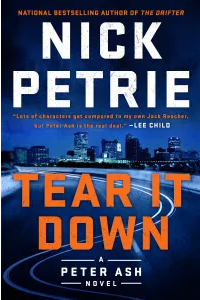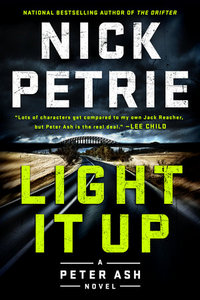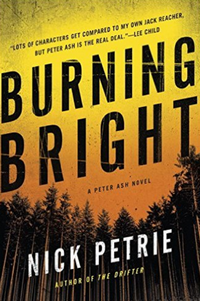by Nicholas Petrie
Series: Peter Ash, #1
Trade Paperback, 371 pg.
G. P. Putnam’s Sons, 2015
Read: August 16 – 17, 2018

Peter pushed the truck hard toward downtown, the city roads rough with potholes, trying to get to Lake Capital begot they closed the doors for the day.
One eye on the rearview, watching for the black Ford. But it would be easy to miss in heavy traffic. And Peter’s truck would be easy to follow. Unless he was willing to rent a beige sedan, he couldn’t do anything about it.
He didn’t have a plan for Lake Capital. But the principle wasn’t complicated. It was the same principle he’d operated under for years.
Poke a stick into something and see what happened.
This approach to problem solving isn’t new — Philip Marlowe employed it, Spenser loves it, Harry Dresden has invoked it — and I’m pretty sure a certain homeless former MP has mentioned it a time or two. It may be tried and true — but that’s only because it works really well (at least in fiction). Peter Ash is one of the leading candidates for “the next Jack Reacher,” so he might as well employ it, too. It’s a very effective stick in this instance, I should add.
Now Reacher, as you probably know, was a career Army MP, the son of a career Marine officer — he’d spent his entire life living on military bases until his discharge following the Army’s downsizing after the fall of the Berlin Wall. In reaction to that kind of living, he’s taken to walking all over the US, getting to know the country. Peter Ash is a recently discharged Marine Lieutenant, with a couple of degrees in economics, who is wandering around the country a little bit. His reason for it differs from Reacher’s, since coming back to the States after tours in Iraq and Afghanistan, Peter has panic attacks anytime he’s indoors — he calls it “white static.”
This has led to him essentially living in the woods for the past few months, until he heard that his former sergeant and friend, Jimmy Johnson, has killed himself. Peter quickly came to Milwaukee to visit Jimmy’s wife, Dinah. He wasn’t around to help his friend, but maybe he can assuage his guilt by helping out with some much needed home repairs on his behalf.
He starts with the front porch — and while he’s working on it, discovers a hidden suitcase filled with money, and four bricks of plastic explosive. This seems strange, Peter hides the bricks, and gives the money to Dinah. Around the same time, a mysterious figure comes by looking for something (probably the suitcase, but he never mentions is). The two of these together gets Peter’s curiosity piqued — and he sets out to find out what his friend was up to before he died. He barely beings this before someone tries to kill him.
Peter survives, and becomes even more certain that something is going on — Jimmy was on to something just before he died. Peter has to find out what — to honor Jimmy’s memory, protect Dinah and her two sons, and maybe get a little peace for himself — maybe find some forgiveness for failing to help Jimmy.
This isn’t just guy wanders into town, finds trouble and starts hitting/shooting things and people until the problem is solved. Peter has to think, he has to investigate, he takes wrong paths, he really needs to find a shower and a way to clean a very large dog — which isn’t saying anything about the investigation, it’s just another thing he has to do along the way (still, harder problems than you might expect when you throw in his white static). There’s plenty of hitting and shooting, but it’s not the focus.
Yes, Peter is very much in the Reacher mold — but he’s different in very significant ways. The ways in which he’s not Reacher make him a fascinating character on his own. He has a sense of humor, he’s lonely, he’s a bit more self-reflective — he knows that he didn’t come back from the wars whole and intact, and is seeking to fix that. Maybe. He’s got a different kind of education, and a different way of looking at the world. The ways he’s similar to Reacher (good with weapons, devastating to hand-to-hand combat opponents, fast thinking, strategic, etc.) simply ensure that he’s fun to read about. Both of these sides together give us a Thriller protagonist that’s a sheer pleasure to read.
So Peter has “White Static”, Jimmy clearly had problems adjusting to being back home, but they’re not treated as the only ones — there are many others seen and talked about in this book. It’s not done exploitatively, it’s done to highlight the problems and the many, various ways they can be addressed successfully. Nor are they talked about in a way that suggests everyone who comes back from combat service comes back damaged. Nothing is universalized or generalized. I’m certainly not speaking from any kind of first, or even second-hand, experience here — but it appears to me that Petrie dealt with these psyches in just the right way — compassionate, understanding, and accepting.
As there is an element of mystery to the story, I’m not going to talk about the villains much. But they are just as good as the rest of the book — wide-ranging motivations, differing levels of commitment to the enterprise, they’re not all cookie-cutter types. They are not cartoonish, they are not super-villains. They are straight-from-the-headlines evil though. I could absolutely see something like this happening and it working.
I could have spent more time with just about every other supporting character — not in a “hey, you could’ve developed them better” way, but in a “I liked them and enjoyed Peter’s interactions with them” kind of way. Sure, that would’ve involved more character development, but not because they were lacking anything, it just would have worked out that way. Dinah’s an ER nurse with a lot of grit, and isn’t sure what to think of her late husband — but is dedicated to being the best mom she can to their kids. Charlie, their oldest, has learned a lot from his dad and is trying his pre-teen best to live like he should and be “the man of the house.” There’s a woman from the Veteran’s group that tried to help Jimmy who is a wonderful character, too. I could say more about her and the other supporting characters, but you should meet them yourself.
The last advantage that this one has over any of the Jack Reacher novels — and frankly, most Thrillers, is Mingus. He’s a very large dog that Ash finds living under the porch at his friend’s house (that porch led to the discovery of a lot) — he’s a bigger, nastier version of Walt Longmire’s Dog. Just as friendly, too — toward people not being threatening, anyway.
Okay, I obviously found this fantastic. The tension was high throughout; the pacing was fantastic; the actions scenes were fast, furious and believable; the story was clever and yet sensitive to current events, and the people represented by the characters; the stakes were real and believable; Peter’s code and the code(s) of those around him are wonderful to think about, examine and possibly try to adopt. They don’t get much closer to perfect than this — I’m definitely picking up the next two in the series as soon as I can, and I can’t wait to talk about them without nearly so many references to Jack Whatshisname.
—–

 This is a weekly bloghop hosted by Freda’s Voice.
This is a weekly bloghop hosted by Freda’s Voice. Grab a book, any book.
Grab a book, any book. Turn to Page 56 or 56% on your ereader. If you have to improvise, that is okay.
Turn to Page 56 or 56% on your ereader. If you have to improvise, that is okay. Find a snippet, short and sweet.
Find a snippet, short and sweet. Post it
Post it

![]()






 At multiple points both Peter and June note that Peter’s having fun when it’s dangerous, when things are violent, when the bullets are flying. As a reader, this is great—you don’t see Reacher, Charlie Fox, Evan Smoak, etc. enjoying things quite like this. But I’m a little worried about what it says about him as a person.
At multiple points both Peter and June note that Peter’s having fun when it’s dangerous, when things are violent, when the bullets are flying. As a reader, this is great—you don’t see Reacher, Charlie Fox, Evan Smoak, etc. enjoying things quite like this. But I’m a little worried about what it says about him as a person.



